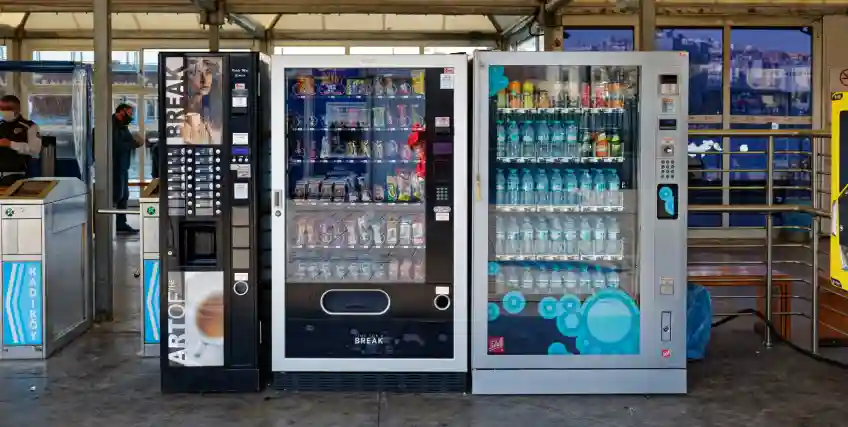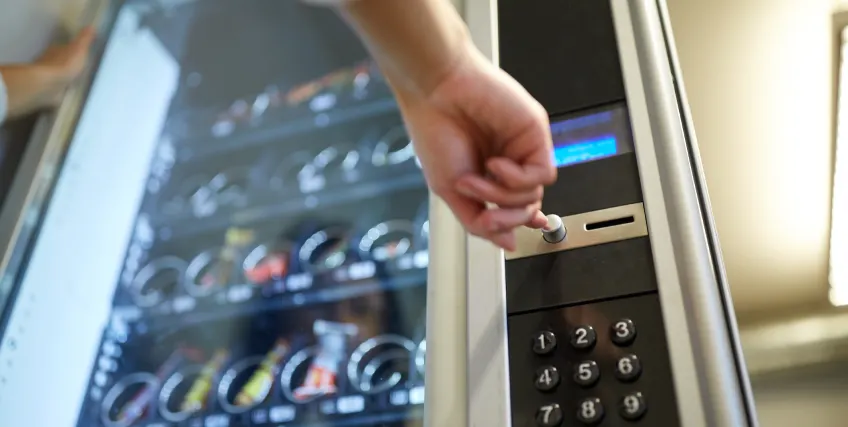How to Secure Vending Financing
Aug 14, 2025 | Last Updated on: Aug 18, 2025

A vending machine business can be a great option for entrepreneurs who are looking for a scalable, semi-passive income stream. Vending machines offer a gateway into the world of business ownership because there are relatively low startup fees and you can operate the business without full-time staff. However, like any new venture, starting a vending machine business requires capital — and knowing how to secure funding is essential for launching successfully.
This guide will walk you through everything you need to know about vending financing and the vending machine business. Learn about the startup costs, how to identify the best financing options, how to know what lenders look for, and how to write a strong business plan to support your vending machine loan application.
Startup Costs for Vending Financing
Before reaching out to any lender or investor for vending machine financing, you need a precise understanding of how much capital you’ll require for your small business. Vending machine businesses have comparatively lower startup costs than many other ventures, but there are still several important expense categories to consider.
Vending Machines
The cost of a vending machine varies widely based on the type, size, and whether it is new or refurbished. Here are fees to consider when planning for vending financing.
- Snack or drink vending machines
- Combo machines (snacks & drinks)
- Specialty machines (coffee, frozen foods, electronics)
Refurbished machines can offer significant savings but may come with limited warranties.
Location Fees or Lease Agreements
Location is everything for building vending machine success. However, these high-traffic areas such as malls, schools, gyms, or office buildings often require you to pay either a flat monthly rental fee, or commissions on sales. Some vending machine locations may allow free placement in exchange for occasional donations or community support.
Initial Inventory
Stocking your machines with snacks, beverages, or other products is a crucial early investment. Inventory costs will vary based on the number and type of machines you operate. Vending machines must be regularly replenished, so initial capital should cover at least your first few restocking cycles.
Licenses, Permits, and Insurance
Depending on your location, you may need a business license, a sales tax permit, a food handling certification, and liability insurance.
Maintenance and Miscellaneous Supplies
You’ll need tools and spare parts for repairs, coin and bill counters, and potentially a vehicle for servicing your routes.
Vending Financing Options
Once you have a firm grasp on how much you need, it’s time to explore funding sources. Because vending businesses are typically considered small and low-risk ventures, a wide range of financing options may be available including those for entrepreneurs with limited credit or collateral.
SBA Microloans
The U.S. Small Business Administration (SBA) offers microloans up to $50,000 for startups and small businesses. These loans are ideal for vending entrepreneurs due to their manageable size and relatively lenient requirements.
- Typical loan size varies
- Interest rates vary
- Repayment terms: Up to 6 years
- Requirements: Business plan, financial projections, and possibly some collateral
SBA microloans are issued through nonprofit lenders, making them more accessible for first-time business owners.
Personal Loans
For those just starting out, personal loans may be the fastest and simplest option — especially if you don’t yet have a business entity or revenue history. Pay attention to the interest rates and repayment terms for the loan amount. Keep in mind that personal loans impact your personal credit, and you’re personally liable for repayment.
Business Credit Cards
If your funding needs are small, a business credit card with a 0% introductory APR can help you make necessary purchases while deferring interest payments. A business credit card is ideal for buying inventory or equipment. However, this form of vending financing requires good credit and often has high interest rates. Many vending operators combine credit cards with other forms of financing to maximize flexibility.
Equipment Financing
Some vending machine suppliers offer financing options or leasing plans directly. This allows you to acquire machines while spreading payments over time. With equipment financing, there is no large upfront cost. However, this financing will be a higher total cost over time due to interest or lease fees. Equipment financing is often quicker than bank loans, with minimal documentation required.
Grants and Competitions
Although it isn’t very common, some local governments and business incubators offer small grants or competitions for new entrepreneurs. For vending financing, research community development financial institutions (CDFIs), especially if you are a minority, woman, or veteran business owner.
What Are Lenders Look for in New Vending Financing?
Securing vending financing often means convincing a lender that your business is viable. Even if you’re applying for a microloan or personal loan, lenders will typically assess several key factors:
Strong Credit
A strong personal credit score is a major advantage. If your credit is lower, consider applying with a co-signer, securing collateral, and building business credit early with a secured card or vendor accounts
Business Plan and Financial Projections
Lenders want to see that you’ve done your homework. A well-written business plan is essential (more on that below).
Industry Knowledge
Even though vending is relatively easy to enter, lenders prefer applicants who understand route management, inventory tracking, and machine maintenance.
Collateral or Down Payment
Some loans may require a down payment or some form of collateral. Used vehicles, cash savings, or the vending machines themselves may be considered.
Cash Flow Expectations
Lenders want to see that your vending operation will generate enough cash flow to cover loan payments. You should be prepared to show estimated income and expenses, especially for the first six to 12 months.
A Business Plan for Your Loan Vending Financing Application
Your business plan is your pitch to potential lenders, it tells them who you are, what you’re doing, and why your venture will succeed. Here’s what to include:
Create an Executive Summary: Write a brief description of your business and clearly outline your goals for the first one to two years. Identify the amount of funding that you’re requesting and how you are planning to use it.
Company Overview: Have your business name and structure (LLC, sole proprietorship, etc.) planned in advance of your application. Make sure to include ownership details, geographical information, and which market you’re planning on serving.
Market Analysis: Build out your marketing analysis, including demographics and behaviors of your target market. Also, do your research on competitor analysis. Are there other vending machines nearby? Compare industry trends and current demand for vending machine products in your region.
Marketing and Sales Strategy: Prepare how you’ll find and secure vending locations. Build a plan for stocking and rotating inventory for your vending machine. Also, create a pricing strategy and which promotions you’ll be pushing through sales and marketing.
Operations Plan: Your operations plan should include how many vending machines you’ll be acquiring and the type of machines. You’ll also need to prepare your delivery routes, frequency of servicing, and hiring plans. Along with these projections, you’ll need to figure out who your suppliers are and how you’ll get inventory sourcing.
Financial Projections: When applying for vending financing, be sure to make projections for startups costs, monthly revenue and expense forecasts, break even analysis, and loan repayment plans.
Appendices: Your appendices in your vending financing application should include equipment quotes, location agreements, personal and business credit reports, and business licenses and permits.
Some of the Best Practices for Vending Financing
- Begin Small: Get set up with one to three machines to demonstrate success before scaling.
- Leverage Existing Resources: If you have personal savings, family/friends, or crowdfunding to complement loans.
- Build Business Credit: Open a business checking account, get an EIN, and apply for small vendor credit lines.
- Get Organized: Keep all expenses, maintain financial records, and update your business plan regularly.
- Network and Communicate: Join vending associations, local chambers of commerce, or entrepreneur groups to learn from others and find support.
Final Thoughts on Vending Financing
Securing vending financing doesn’t have to be overwhelming. By understanding loans for small businesses, exploring the right machine financing options, and presenting a strong, well-researched business plan, you can dramatically increase your chances of getting approved for vending financing.
Whether it’s your first machine in a breakroom or your tenth in a route, solid vending financing is the foundation to turning your vending idea into a sustainable business.
FAQs About Vending Financing
What is an SBA microloan?
The U.S. Small Business Administration (SBA) offers microloans up to $50,000 for startups and small businesses. These loans are ideal for vending entrepreneurs due to their manageable size and relatively lenient requirements.
Should you have a business bank account for vending machines?
You may open a business checking account, get an EIN, and apply for small vendor credit lines.
What is equipment financing?
Equipment financing allows you to acquire machines while spreading payments over time. With equipment financing, there is no large upfront cost. However, this financing will be a higher total cost over time due to interest or lease fees. Equipment financing is often quicker than bank loans, with minimal documentation required.
What types of location fees come with a vending machine business?
Location is everything for building vending machine success. However, these high-traffic areas such as malls, schools, gyms, or office buildings often require you to pay either a flat monthly rental fee, or commissions on sales. Some vending machine locations may allow free placement in exchange for occasional donations or community support.
What is an operations plan for a vending machine business?
Your operations plan should include how many vending machines you’ll be acquiring and the type of machines. You’ll also need to prepare your delivery routes, frequency of servicing, and hiring plans. Along with these projections, you’ll need to figure out who your suppliers are and how you’ll get inventory sourcing.
Frequent searches leading to this page
Term Loans are made by Itria Ventures LLC or Cross River Bank, Member FDIC. This is not a deposit product. California residents: Itria Ventures LLC is licensed by the Department of Financial Protection and Innovation. Loans are made or arranged pursuant to California Financing Law License # 60DBO-35839




